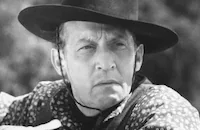The Affairs of Anatol
Brief Synopsis
Cast & Crew
Cecil B. De Mille
Wallace Reid
Gloria Swanson
Elliott Dexter
Bebe Daniels
Monte Blue
Film Details
Technical Specs

Synopsis
Anatol and his wife, Vivian, come to the Green Fan Cafe, where Anatol recognizes Emilie, a former school companion, with Bronson, a wealthy rake, and persuades her to leave him. Emilie deceives him, however, by failing to throw her diamonds into the river, and out of anger Anatol wrecks her apartment. On the way to the country, Anatol saves Annie Elliot from drowning herself after she is repudiated by her husband for stealing church funds; Annie then steals Anatol's purse and kisses him as Vivian returns with a doctor. At a society gathering, Vivian is hypnotized by a magician, and Anatol, in disgust, seeks out Satan Synne, supposedly New York's wickedest woman. He discovers, however, that Satan is actually the loving wife of a disabled soldier in need of an operation. She obtains the money from Anatol after he learns the truth; disgusted, he returns home to make peace with Vivian.

Director

Cecil B. De Mille
Cast
Wallace Reid

Gloria Swanson
Elliott Dexter

Bebe Daniels

Monte Blue
Wanda Hawley
Theodore Roberts
Agnes Ayres
Theodore Kosloff

Polly Moran

Raymond Hatton
Julia Faye
Charles Ogle
Winter Hall
Crew

Film Details
Technical Specs

Articles
The Affairs of Anatol
Wallace Reid stars as Anatol Spencer, a sophisticated newlywed with a suitably glamorous wife (Gloria Swanson). He is led astray by the glance of a childhood sweetheart (Wanda Hawley), whom he spies in a decadent nightclub as she is being corrupted by a wealthy lecher (Theodore Roberts). Suffering from a White Knight complex, Anatol makes it his mission to rescue the innocent damsel, donating time and energy to her regeneration that might be better spent with his wife. Inevitably, the neglected wife finds herself attracted to Anatol's closest friend, Max (Elliott Dexter). Anatol's noble crusades lead him into the arms of a suicidal farmwoman (Agnes Ayres) and into the clutches of a raven-haired seductress known simply as "Satan Synne" (Bebe Daniels).
A crucial ingredient to DeMille's dramas was the moral judgment passed upon the characters in the final reel. By assuming the guise of pious morality plays his adulterous dramas were granted a license to indulge in all forms of debauchery. Occasionally DeMille would spice up his dramas by inserting flashbacks of the orgies of the Roman Empire, but this was hardly necessary in The Affairs of Anatol where one nightclub (according to an intertitle), "makes the Feasts of Babylon look like a Cafeteria!" Audiences could thus freely enjoy the spectacle of sin with the comforting knowledge that a few closing title cards would set things right in the Spencer household and the mind of the self-righteous viewer.
This judgmental approach runs counter to the philosophy of the author of Anatol, the play upon which the film was based. Arthur Schnitzler -- whose works were the foundation of Max Ophuls' La Ronde (1950) and Stanley Kubrick's Eyes Wide Shut (1999) -- held a more mature and open-minded approach to sex. "Schnitzler has nothing to do with moralists or morality," writes Ashley Dukes in the introduction to the 1917 edition of Anatol, "His subject is always the same -- the lover and a mistress or two...His work is never ugly. He avoids sensuality by his honesty as an artist. There is nothing unnatural, nothing immoral, nothing even furtive for him in the relationship of lover and mistress."
In his defense, DeMille wasn't trying to be Schnitzler. He was making Anatol his own. To American movie-going audiences, he was the novelist/playwright's equal, if not superior. In his review of the film, Life Magazine columnist Robert E. Sherwood cleverly needled the lowbrow Hollywood vision of sexual sophistication, "It should be enormously popular, especially with those who think Schnitzler is a cheese."
Schnitzler's original play is divided into seven episodes, as Anatol encounters a series of mistresses, past present and future (there is no wife present to complicate his affairs).
Screenwriter Jeanie Macpherson (a consistent DeMille collaborator), maintained the play's episodic structure but reduced the seven episodes into five, retitling the film Five Kisses. Prior to release, however, one of Anatol's affairs was removed and the production (which might have then become Four Kisses) was retitled The Affairs of Anatol. The missing "kiss" did eventually see the light of the silver screen. The footage, in which Anatol romances a beautiful athlete (Dorothy Cumming), was handed over to director Sam Wood, who expanded it into a feature film, Don't Tell Everything (1921). Swanson and Dexter also appear in the film, via these outtakes.
There were some legal squabbles over the literary origins of The Affairs of Anatol. In 1920, W. Somerset Maugham had discussed a story idea with DeMille and Paramount Pictures head Jesse L. Lasky (reports conflict as to whether or not this was an original story or a specific approach to adapting Anatol). When the film was released, and Maugham saw what he perceived as his ideas on screen, he threatened to sue Lasky and DeMille for plagiarism. "He wired Jesse a dignified protest naming witnesses," remembered DeMille in his autobiography, "but when the facts were laid before him, it was not difficult to convince that superb literary craftsman that I had been working on this particular film for many weeks before his arrival in Hollywood and that there was only the remotest superficial resemblance between his story and ours."
Aside from some structural similarities, The Affairs of Anatol barely resembles Schnitzler's original. Rather than being "based on" Anatol, DeMille stated, "it would be more accurate to say 'suggested by' the play by Arthur Schnitzler." In fact, Lasky and DeMille licensed Schnitzler's play almost as an afterthought. Motion Picture Magazine insinuated that the film was originally produced as an unauthorized adaptation -- that the title Five Kisses (with altered character names) was an aborted attempt to plagiarize Schnitzler's play without paying the "huge sum" necessary to clear the rights. Today we cannot know for sure if this is the case, or whether DeMille licensed Schnitzler's play as a way of deflecting Maugham's accusations of plagiarism. One thing is certain, attaching the name of Arthur Schnitzler endowed the film with a distinct layer of European sophistication and an air of sexual liberalism, regardless of how closely the screenplay adhered to the original text.
The Affairs of Anatol was the last of seven films in which Swanson starred under DeMille's direction. The director offered the actress her choice of roles in the film, and Swanson reportedly allowed him to choose. He opted for Vivian, the neglected wife, because she appeared throughout the film, rather than being relegated to a single episode. Swanson and DeMille were reunited almost 30 years later, reprising their roles as silent-movie director and actress, in Billy Wilder's Sunset Boulevard (1950).
For leading man Wallace Reid, there were no reunions. Reid died in 1922 of causes related to drug and alcohol abuse. He had become addicted to morphine while recovering from a head injury incurred in a 1919 train wreck on the way to a location shoot. As the movies entered the roaring twenties, Reid became a symbol of the wanton behavior of the Hollywood elite, even as he was held as an enlightening example of the insidious dangers of drug addiction. Reid's widow, Dorothy Davenport, later produced and directed films warning against the various pitfalls of modern life (including Human Wreckage [1923], The Red Kimono [1925] and The Road to Ruin [1934]). Curiously, these films often employed the DeMille approach to vice, in which the moral lesson comes after the audience has enjoyed a lengthy tour through the gin joints and seedy bedrooms of irresponsible living.
Producer/Director: Cecil B. DeMille
Screenplay: Jeanie Macpherson, Based on the play Anatol by Arthur Schnitzler
Cinematography: Alvin Wyckoff and Karl Struss
Production Design: Paul Iribe
Music: Brian Benison (1999)
Cast: Wallace Reid (Anatol Spencer), Gloria Swanson (Vivian Spencer), Wanda Hawley (Emilie Dixon), Elliott Dexter (Max Runyon), Bebe Daniels (Satan Synne), Agnes Ayres (Annie Elliott), Monte Blue (Abner Elliott).
BW-118m.
by Bret Wood

The Affairs of Anatol
Quotes
Trivia
Arthur Schnitzler's original one-act play, Anatol, was written in 1893. Harley Granville-Barker's English adaptation opened in New York City, New York, USA on 14 October 1912 with John Barrymore in the title role, and it had 72 performances.
Notes
The working titles of this film were Anatol and Five Kisses.

Miscellaneous Notes
Released in United States 1995
Released in United States April 1981
Released in United States Fall September 25, 1921
Released in United States February 2007
Shown at Berlin International Film Festival (Retrospective) February 8-18, 2007.
Shown at the Museum of Modern Art (Screen Plays: From Broadway to Hollywood, 1920-1966) in New York City on October 2 and October 3, 1995.
Released in United States 1995 (Shown at the Museum of Modern Art (Screen Plays: From Broadway to Hollywood, 1920-1966) in New York City on October 2 and October 3, 1995.)
Released in United States February 2007 (Shown at Berlin International Film Festival (Retrospective) February 8-18, 2007.)
Released in United States April 1981 (Shown at FILMEX: Los Angeles International Film Exposition (Treasures from AFI) April 2-23, 1981.)
Released in United States Fall September 25, 1921













